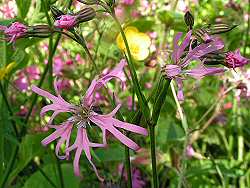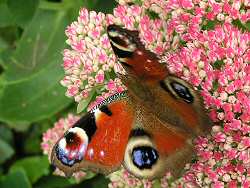Features: Wildlife Trust Articles |  |
Climate change in the garden A golden rule for wildlife gardeners is 'work with nature; not against it' A golden rule for wildlife gardeners is 'work with nature; not against it' A golden rule for wildlife gardeners is 'work with nature; not against it'. In practical terms that can mean planting drought tolerant plants in areas of low rainfall or those adapted to boggier conditions in wetter parts of the country. But A golden rule for wildlife gardeners is 'work with nature; not against it'. In practical terms that can mean planting drought tolerant plants in areas of low rainfall or those adapted to boggier conditions in wetter parts of the country. But  nowadays the problem is predicting what the prevailing weather conditions will be nowadays the problem is predicting what the prevailing weather conditions will be nowadays the problem is predicting what the prevailing weather conditions will be! After the very dry summer of 2003 anyone could be forgiven for stocking up on drought-tolerant plants at the start of 2004 (as recommended by English Nature, the government's conservation advisory body); but by the end of the wettest August on record in 2004 that might not have seemed like such a good idea! What is the humble gardener to do in the face of such uncertainty? nowadays the problem is predicting what the prevailing weather conditions will be! After the very dry summer of 2003 anyone could be forgiven for stocking up on drought-tolerant plants at the start of 2004 (as recommended by English Nature, the government's conservation advisory body); but by the end of the wettest August on record in 2004 that might not have seemed like such a good idea! What is the humble gardener to do in the face of such uncertainty?
A global problem Sometimes its hard to know whether we should be planting moisture loving plants like these ragged robin (Lychnis flos-cuculi) or those that prefer drier conditions.
Take a step back and consider the wider issue: climate change. If you've ever doubted that 'global warming' is for real, one statistic should be enough to convince you that it is: Sometimes its hard to know whether we should be planting moisture loving plants like these ragged robin (Lychnis flos-cuculi) or those that prefer drier conditions.
Take a step back and consider the wider issue: climate change. If you've ever doubted that 'global warming' is for real, one statistic should be enough to convince you that it is:  the earth's ten hottest years (since accurate measurements began in the late 1800s) have all occurred since 1989 the earth's ten hottest years (since accurate measurements began in the late 1800s) have all occurred since 1989 the earth's ten hottest years (since accurate measurements began in the late 1800s) have all occurred since 1989. Although global warming is very real, a genuine debate rages about its causes: is it happening because of our carbon emissions or is it just another wobble in the earth's long term climatic cycles? the earth's ten hottest years (since accurate measurements began in the late 1800s) have all occurred since 1989. Although global warming is very real, a genuine debate rages about its causes: is it happening because of our carbon emissions or is it just another wobble in the earth's long term climatic cycles?
For us gardeners, the answer to that question is, in some ways, academic because whatever the causes, we are still left to contend with the effects. Because weather is complex and unpredictable,  we cannot yet determine whether global warming means 'drought' or 'flood' and for now we must simply regard the problem as one of 'climatic uncertainty' we cannot yet determine whether global warming means 'drought' or 'flood' and for now we must simply regard the problem as one of 'climatic uncertainty' we cannot yet determine whether global warming means 'drought' or 'flood' and for now we must simply regard the problem as one of 'climatic uncertainty'. But one pattern does seem to be emerging; and that's of extremes at both ends of the climatic scale. How many times over the last few years have you heard the phrases 'wettest on record' and 'driest on record' all applied to our own little island? we cannot yet determine whether global warming means 'drought' or 'flood' and for now we must simply regard the problem as one of 'climatic uncertainty'. But one pattern does seem to be emerging; and that's of extremes at both ends of the climatic scale. How many times over the last few years have you heard the phrases 'wettest on record' and 'driest on record' all applied to our own little island?
Local action Parts of the garden that are becoming drier can support plants like these Sedum spectabile.
Given that it would seem unwise for us to turn our plots over to bog gardens on the back of one record wet month when the next is just as likely to turn out to be a record dry one, what practical action can we take? My advice is not to do anything rashly: although mistakes in the garden are part of the normal process of gardening, big mistakes can be very expensive and stressful. Parts of the garden that are becoming drier can support plants like these Sedum spectabile.
Given that it would seem unwise for us to turn our plots over to bog gardens on the back of one record wet month when the next is just as likely to turn out to be a record dry one, what practical action can we take? My advice is not to do anything rashly: although mistakes in the garden are part of the normal process of gardening, big mistakes can be very expensive and stressful.  Be a careful and patient observer of nature in your own garden; notice what type of plants have done well Be a careful and patient observer of nature in your own garden; notice what type of plants have done well Be a careful and patient observer of nature in your own garden; notice what type of plants have done well in your garden (and those of your neighbours) over the last decade or so - that will tell you more about the effects of climate change in your own garden than any number of weather forecasts. If your sedums have done particularly well over the last few years, then you are on pretty safe ground if you decide to make more of a feature of them. And if your bog garden is flourishing like never before, you might do well to expand it. Be a careful and patient observer of nature in your own garden; notice what type of plants have done well in your garden (and those of your neighbours) over the last decade or so - that will tell you more about the effects of climate change in your own garden than any number of weather forecasts. If your sedums have done particularly well over the last few years, then you are on pretty safe ground if you decide to make more of a feature of them. And if your bog garden is flourishing like never before, you might do well to expand it.
In all but the smallest plots, consider different areas of your garden separately: their microclimates might be affected in different ways by the changes in weather patterns. You might find that whilst the majority of your garden remains unperturbed, there is one particular part that appears to becoming drier or wetter.
 One practical step that anyone can take is better management and conservation of rainwater. It makes sense to save rainwater in times of plenty and then use it on the garden when the need arises One practical step that anyone can take is better management and conservation of rainwater. It makes sense to save rainwater in times of plenty and then use it on the garden when the need arises One practical step that anyone can take is better management and conservation of rainwater. It makes sense to save rainwater in times of plenty and then use it on the garden when the need arises. Topping up a pond with tap water in dry weather can lead to green water because the nutrients in tap water encourage a bloom of algae: you will get no such problems if you top up the pond with rainwater. Although it is not cheap to fit rainwater butts to your down-pipes, you may find that its money well spent if it helps you ameliorate the effects on your garden of our increasingly uncertain weather. One practical step that anyone can take is better management and conservation of rainwater. It makes sense to save rainwater in times of plenty and then use it on the garden when the need arises. Topping up a pond with tap water in dry weather can lead to green water because the nutrients in tap water encourage a bloom of algae: you will get no such problems if you top up the pond with rainwater. Although it is not cheap to fit rainwater butts to your down-pipes, you may find that its money well spent if it helps you ameliorate the effects on your garden of our increasingly uncertain weather.
| First published September 2004. | |
Copyright Richard Burkmar. Permission is hereby granted for anyone to use this article for non-commercial purposes which are of benefit to the natural environment as long the original author is credited. School pupils, students, teachers and educators are invited to use the article freely. Use for commercial purposes is prohibited unless permission is obtained from the copyright holder. |
Back to home page
Do you live in Merseyside? Interested in its wildlife? |